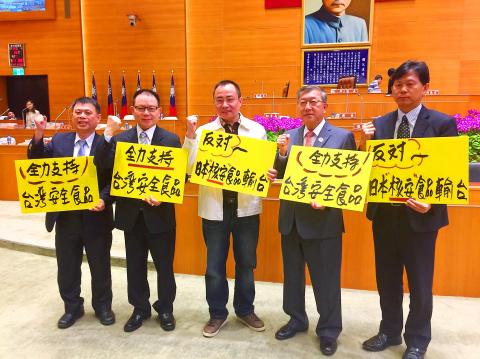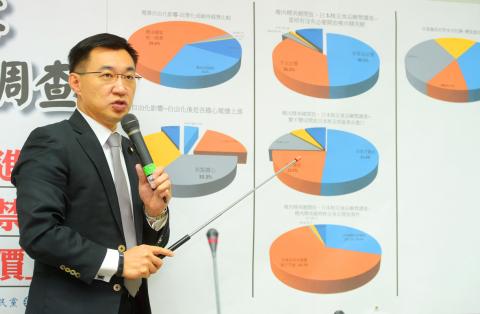Premier Lin Chuan (林全) yesterday reaffirmed the government’s plan to lift a ban on Japanese food products from five radiation-affected prefectures, saying that the deregulation would be carried out scientifically and gradually, while confirming that extra public hearings are planned after the 10 held over the weekend and on Monday ended in chaos due to protesters’ interference.
Taiwan and China are the only two nations that maintain a ban on food imports from the Japanese prefectures of Fukushima, Ibaraki, Tochigi, Gunma and Chiba, but Taiwan has to adopt a scientific approach to the food safety issue, as the ban creates an unfair trading environment, Lin said on Monday during a televised interview.
“Scientifically speaking, if the products pose no health risk, should we not reopen [imports of banned Japanese food] like other nations?” Lin said. “From a free trade perspective, it is absolutely unreasonable to prohibit products that are not radioactively contaminated.”

Photo: Tsai Meng-shang, Taipei Times
The nation has suspended food imports from the five prefectures since the Fukushima Dai-ichi nuclear power plant disaster in March 2011.
Lin said that the ban would be lifted partially and conditionally, as food products from Fukushima Prefecture are to remain banned and products from Ibaraki, Tochigi, Gunma and Chiba are to be allowed conditionally, while aquatic products and wild mushrooms from those prefectures would remain prohibited.
Produce from the Ibaraki, Tochigi, Gunma and Chiba have been collectively and mistakenly described as radioactively contaminated, Lin said, likening the prefectures to Changhua and Miaoli counties’ proximity to nuclear power plants in New Taipei City.

Photo: Chang Chia-ming, Taipei Times
The government will not lift the ban on products considered to be risky to consumers, even if they are allowed to circulate in Japan, such as foods that are prohibited for people younger than 18 due to high radioactivity.
“Our standards will only be stricter, not more relaxed, than those of Japan,” Lin said.
Lin’s remarks were aimed at easing public concern about the proposed lifting of the ban, as the controversy surrounding the issue has escalated, with protesters paralyzing 10 public hearings held by the Cabinet on the issue, while a Democratic Progressive Party (DPP) lawmaker has publicly opposed the proposal.
Lin said he regretted violence at the hearings, adding that the government has not yet finalized a deregulation plan and welcomes the public’s opinions.
“The new government has been dealing with unfair trade [regulations] on Japanese food imports at a gradual pace, but the government does not have to lift the ban now,” Lin said.
The Japanese government complained about Taiwan’s strict import rules well before the DPP took power in May, and Japanese trade representatives paid him a visit when he was running a DPP think tank, Lin said.
He rejected allegations that the proposed easing was made in exchange for closer economic ties and a meeting between People First Party James Soong (宋楚瑜) and Japanese Prime Minister Shinzo Abe at this weekend’s APEC summit, at which Soong is to represent President Tsai Ing-wen (蔡英文).
“The allegations are too far-fetched, too unrealistic. I have to say that there is no such a thing,” he said.
Lin confirmed that extra public hearings on lifting the ban would be held, but did not specify how many or when they would take place.
Meanwhile, the legislature yesterday failed to reach a consensus on the issue, as DPP lawmakers did not show up for a cross-caucus negotiation.
The Chinese Nationalist Party (KMT) caucus has demanded that a Taiwan-Japan mutual judicial assistance agreement be signed before the ban on food products from Japan’s radiation-affected regions be lifted.
The New Power Party caucus has called for the establishment of a Taiwan-Japan investigation and evaluation team, saying no imports should be allowed before the team presents a comprehensive report to the legislature.
Additional reporting by CNA

GEARING UP: An invasion would be difficult and would strain China’s forces, but it has conducted large-scale training supporting an invasion scenario, the report said China increased its military pressure on Taiwan last year and took other steps in preparation for a potential invasion, an annual report published by the US Department of Defense on Wednesday showed. “Throughout 2023, Beijing continued to erode longstanding norms in and around Taiwan by employing a range of pressure tactics against Taiwan,” the report said, which is titled “Military and Security Developments Involving the People’s Republic of China (PRC) 2024.” The Chinese People’s Liberation Army (PLA) “is preparing for a contingency to unify Taiwan with the PRC by force, if perceived as necessary by Beijing, while simultaneously deterring, delaying or denying

PEACEFUL RESOLUTION: A statement issued following a meeting between Australia and Britain reiterated support for Taiwan and opposition to change in the Taiwan Strait Canada should support the peaceful resolution of Taiwan’s destiny according to the will of Taiwanese, Canadian lawmakers said in a resolution marking the second anniversary of that nation’s Indo-Pacific strategy on Monday. The Canadian House of Commons committee on Canada-Chinese relations made the comment as part of 34 recommendations for the new edition of the strategy, adding that Ottawa should back Taiwan’s meaningful participation in international organizations. Canada’s Indo-Pacific Strategy, first published in October 2022, emphasized that the region’s security, trade, human rights, democracy and environmental protection would play a crucial role in shaping Canada’s future. The strategy called for Canada to deepen

TECH CONFERENCE: Input from industry and academic experts can contribute to future policymaking across government agencies, President William Lai said Multifunctional service robots could be the next new area in which Taiwan could play a significant role, given its strengths in chip manufacturing and software design, Taiwan Semiconductor Manufacturing Co (TSMC, 台積電) chairman and chief executive C.C. Wei (魏哲家) said yesterday. “In the past two months, our customers shared a lot of their future plans with me. Artificial intelligence [AI] and AI applications were the most talked about subjects in our conversation,” Wei said in a speech at the National Science and Technology Conference in Taipei. TSMC, the world’s biggest contract chipmaker, counts Nvidia Corp, Advanced Micro Devices Inc, Apple Inc and

LEAP FORWARD: The new tanks are ‘decades more advanced than’ the army’s current fleet and would enable it to compete with China’s tanks, a source said A shipment of 38 US-made M1A2T Abrams tanks — part of a military procurement package from the US — arrived at the Port of Taipei early yesterday. The vehicles are the first batch of 108 tanks and other items that then-US president Donald Trump announced for Taiwan in 2019. The Ministry of National Defense at the time allocated NT$40.5 billion (US$1.25 billion) for the purchase. To accommodate the arrival of the tanks, the port suspended the use of all terminals and storage area machinery from 6pm last night until 7am this morning. The tanks are expected to be deployed at the army’s training